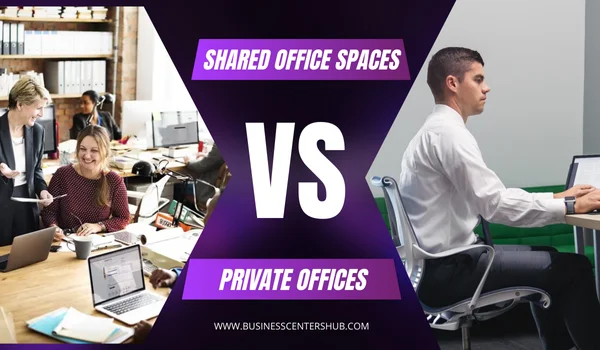Choosing the right workspace is a pivotal decision for businesses, influencing productivity, culture, and bottom-line costs. In the U.S., the debate between shared office spaces (coworking) and private offices is central to this choice. Each offers distinct advantages and challenges. Here’s a comprehensive comparison to guide your decision.
🏢 What Is a Private Office?
A private office is a dedicated workspace rented or leased exclusively for one company. It provides complete control over the environment, layout, and office policies. Typically used by established businesses or teams that require privacy, private offices offer a professional environment for client meetings, confidential discussions, and focused work. Businesses can customize the office according to their brand identity and work culture, but this comes with higher costs and longer lease commitments.
🧑💼 What Is a Shared Office Space (Coworking)?
A shared office space, commonly known as a coworking space, is a flexible, communal workspace where multiple companies or individuals work in a shared environment. Members often pay monthly or even daily fees for access to desks, meeting rooms, and other facilities. Coworking spaces are designed to foster collaboration, networking, and community engagement. They are especially popular among startups, freelancers, and remote workers due to their flexibility and affordability.
🔍 Pros and Cons

✅ Shared Office Spaces (Coworking)
Pros:
- Cost-Effective: Coworking spaces are usually more affordable than private offices, as resources such as internet, utilities, and office equipment are shared among members.
- Flexible Terms: Memberships can be month-to-month, which allows businesses to scale up or down quickly.
- Networking Opportunities: Being in a shared environment encourages collaborations, partnerships, and exposure to potential clients.
- Amenities: Most coworking spaces provide high-speed internet, printing, meeting rooms, and even wellness programs, making the work experience seamless.
Cons:
- Limited Privacy: Open layouts can be distracting and may not be suitable for confidential work.
- Noise Levels: Shared spaces can be noisy, which may affect productivity for tasks requiring deep concentration.
- Variable Quality: Not all coworking spaces maintain the same standards of facilities and services.
✅ Private Offices
Pros:
- Enhanced Privacy: Private offices offer seclusion, making them ideal for sensitive business operations.
- Brand Identity: Companies can fully customize the office to reflect their brand, creating a professional impression on clients and employees.
- Control Over Environment: Businesses have autonomy over layout, policies, and office management.
Cons:
- Higher Costs: Leasing a private office usually involves higher rent and maintenance expenses.
- Long-Term Commitment: Most private office leases require multi-year agreements, reducing flexibility.
- Limited Networking: Private offices can be isolating and offer fewer opportunities for collaboration with other businesses.
💰 Cost Comparison
| Workspace Type | Average Monthly Cost | Ideal For |
| Coworking Space | $150 – $600 | Freelancers, startups, small teams |
| Private Office | $500 – $3,000+ | Established businesses needing privacy |
Note: Costs vary based on location, amenities, and lease terms.
🏙️ Real-World Examples
🧑💻 Coworking Spaces
- WeWork (New York City): Offers hot desks starting at $400/month and private offices from $2,000/month.
- The Wing (San Francisco): A women-only coworking space with memberships ranging from $215/month to $2,350/year.
- Urban Co-Works (Holyoke, MA): Provides private office rentals between $650 and $2,000/month, with memberships starting at $35/day.
🏢 Private Offices
- Regus (Various Locations): Offers private offices starting at $500/month, with flexible lease terms.
- Spaces (Chicago): Provides private office spaces from $800/month, including amenities like high-speed internet and meeting rooms.
- WeWork (San Francisco): Offers private offices starting at $1,500/month, with options for customization and branding.
🧭 Which Option Is Right for You?
Choose Shared Office Space If:
- You’re a freelancer, remote worker, or startup looking for flexibility and cost savings.
- Networking and community engagement are priorities.
- Your business doesn’t require high levels of confidentiality.
Choose Private Office If:
- Your business handles sensitive information requiring confidentiality.
- You need a professional environment to meet clients and establish brand identity.
- You prefer control over your workspace design and policies.
📝 Conclusion
The choice between shared office spaces and private offices hinges on your business’s specific needs, budget, and growth trajectory. Shared spaces offer flexibility and community, making them ideal for startups and freelancers. Private offices provide privacy and control, suitable for businesses requiring confidentiality and a professional setting. Assess your priorities and choose the option that aligns best with your business goals.


